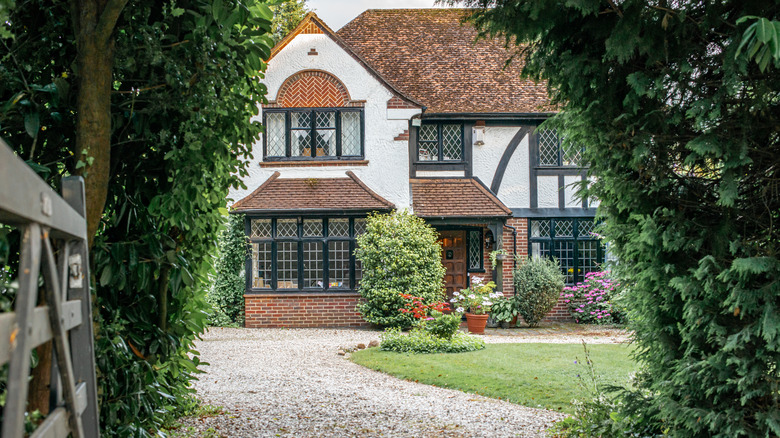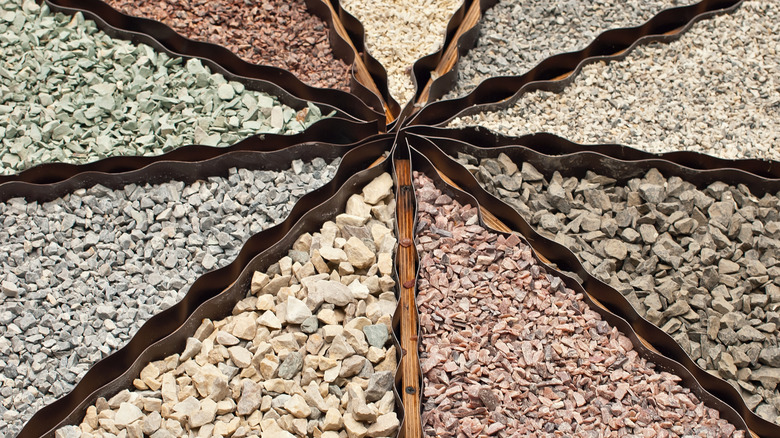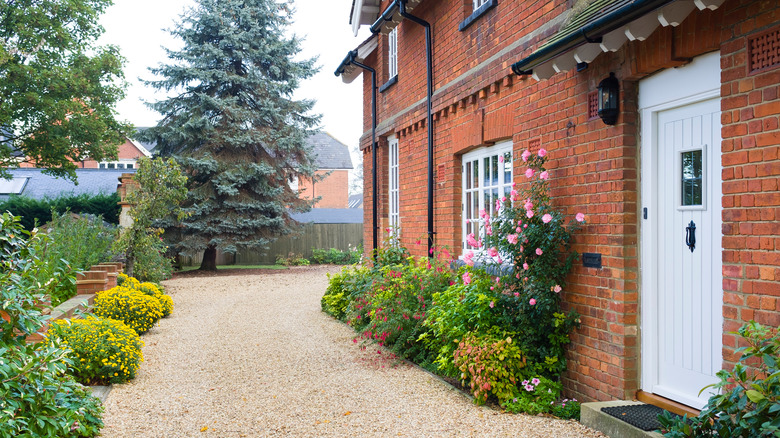How To Know If Crushed Gravel Is Right For Your Driveway
Gravel driveways have become somewhat trendy in recent years for several reasons. For one thing, they're aesthetically pleasing and are attractive alongside older, more traditional homes and can even complement more modern architecture, depending on the type of stone chosen. There's also what some people consider a satisfying sound made when one walks on a gravel driveway: a sort of quiet crunching noise that can also act as an added security measure, warning of unexpected visitors.
There are pros and cons to having a gravel driveway, and it's important to consider these before installing one. Reasons to choose gravel include relatively low cost (average cost is $1 to $2 per square foot, depending on the stone used), many choices of colors, durability, and ease of installation. Gravel is also a more eco-friendly option than asphalt because it provides good drainage, which is helpful for retaining groundwater over time. The downsides of a gravel driveway are mostly weather-related: they are often not able to stand up to heavy snow plowing, and they have a tendency to get somewhat dirty under certain conditions, like during dry summer weather.
It's important to weigh these potential benefits against potential problems down the road. Not every property is a good match for a gravel driveway, depending on climate and weather conditions, the size and shape of your driveway, and other factors.
Benefits of gravel driveways
Gravel driveways are available using various types of stone available in a range of colors (including white, grey, brown, green, red, black, and multi-colored), allowing for a wide range of looks. These different types of stone may vary in cost based on location and availability. Gravel is considered very long-lasting as a driveway material, being much sturdier than concrete or asphalt over time, and lasts up to 100 years or more with regular maintenance and replenishment of the top layer of stone every few years.
The top selling point for many people is that gravel driveways are relatively easy to install. This ease of installation means that choosing a gravel driveway can be much less expensive than installing a concrete or asphalt driveway, which both require heavy-duty equipment and skilled labor. Installing a gravel driveway basically involves delivering gravel to the pre-graded site, and spreading it with rakes or other hand tools, although depending on your site, other preparation may be needed, such as removing old asphalt.
Gravel driveways are a good option for a very long driveway because of their low cost and easy installation. Look into the differences between pea gravel and crushed stone, and determine which is best for you. Pea gravel looks really nice and will withstand normal wear and tear. But crushed stone is recommended if your driveway will have an excessive amount of driving on it from heavier vehicles.
Reasons not to get a gravel driveway
One drawback to a gravel driveway is that it's a difficult surface to plow if you get large amounts of snow in winter. Snow and rain can also move gravel around over time, so if you live in a region that gets heavy rainfall or snowfall, a gravel driveway may not be the best option.
Another downside to gravel driveways is that they can be harder to keep clean than asphalt or concrete. Hosing off a gravel driveway doesn't fully remove small particles of dirt, sand, or other debris. In dry, windy weather (as in summer), this may cause a dirtier environment near your house (e.g., with grit blowing through screens, onto patios, or onto cars), which might be an issue for some homeowners. It can also be difficult to keep a gravel driveway clean of plant debris.
Gravel driveways that are used regularly may also develop ruts or small sinkholes, and these will need to be filled in to maintain the smooth look of your driveway surface. This adds some cost to the ongoing maintenance. In general, you will want to replenish the stone to even out the driveway surface every several years or as desired. No special equipment is needed, just some gravel and a rake to spread it where needed. Many home improvement stores and garden nurseries sell bagged or bulk gravel.


